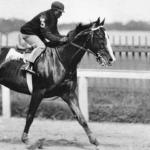
2026 Robert B. Lewis Stakes at a Glance

“Until you go to the Kentucky Derby with your own eyes, behold the Derby, you ain’t never been nowhere and you ain’t never seen nothing.”—Irving S. Cobb
It was a Monday, the start of a new week, but this would go down as anything but a typical Monday. The day began with clear skies, the sun soon joining the multitudes flocking to Louisville’s newest racetrack, their journey presaging a day a century and a half hence. May 17, 1875, was something altogether bigger than a Monday: it was Derby day.
The man behind it all, Meriwether Lewis Clark Jr., was the grandson of explorer William Clark and a pioneer in his own right. His idea of a great race modeled on England’s own Derby soon eclipsed its cousin and sealed this visionary’s place in racing history.
Big Ideas
Clark’s roots in racing go back to his uncles John and Henry Churchill, the namesakes of the Kentucky Derby’s home. The young man went to live with the two bachelors after his mother, Abigail’s, death and through them learned about the finer things in life, including racehorses. Clark’s marriage to Patricia Anderson gave him access to her uncle, another legendary owner and racetracker: Richard Ten Broeck, owner of the famed stallion Lexington.
The sport’s roots in Louisville go back to the 18th century, but by 1870, the area was left bereft of a racetrack when the Woodlawn Course closed. A group of breeders approached Clark and encouraged the young banker and socialite to help them resurrect the city’s racing scene. Rather than rush into action prematurely, Clark decided to travel to Europe and spend more than a year visiting the continent’s best racetracks, learning the business from people like Admiral Henry Rous and Vicomte Daru, both leaders of their respective jockey clubs.
When he returned to Kentucky, Clark shared his vision for the city’s newest racetrack with potential investors. He proposed a new upscale facility and a series of races modeled on the Epsom classics: the two-mile Clark Stakes; the 1 ½-mile Kentucky Oaks; and the crown jewel of them all, the 1 ½-mile Kentucky Derby. In pursuit of his goal, he leased land from his uncles and raised $32,000 to build a new one-mile dirt oval; when that money ran out, Clark used loans to build a small wooden grandstand.
Though winter weather and material shortages delayed construction, the new Louisville Jockey Club made its debut on that monumental Monday, a pleased Clark standing trackside as H.P. McGrath’s Aristides won the inaugural Kentucky Derby, the little red colt becoming the first of an unbroken line of victors.
A Complex Man

From there, Clark made the new racetrack and the sport itself his life’s work, determined to conduct himself and racing with the utmost integrity, so much so that he was not a favorite among many horsemen. He was not only the president of the Louisville Jockey Club, running the business side of the new facility, but also a presiding judge, there to supervise owner, trainer, and jockey, ensuring that the races run at his track were free of any shenanigans.
Ahead of the Ten Broeck – Molly McCarthy match race in July 1878, Clark heard a rumor that the four-mile event might be fixed so he ordered security to watch the two starters’ barns, had their feed locked up as a precaution, and dropped by each horse’s stable daily to check in. Clark put so much effort into avoiding any potential malfeasance that he finished the day unconscious with exhaustion and heatstroke. Ten Broeck beat Mollie McCarthy easily in a slow time, proof to some that the victor had been drugged anyway.
Though he pursued the cleanest racing possible, Clark himself was not always well behaved. His temper sometimes got the best of him, the 1886 Kentucky Derby an example. James Ben Ali Haggin brought his colt Ben Ali to Louisville for the big race and expected that he would win more than just the purse. A dispute locked bookmakers out of that year’s Derby and left Derby day with only auction pools for betting. The lockout frustrated Haggin, who had intended to place several large bets on his colt, and the owner registered his displeasure with Clark. Infuriated by the haranguing, Clark told Haggin “that he could take his horses to ------”; the next day, Haggin’s stable was sent east to New York along with the man’s ire. Clark’s remark prompted Haggin to encourage his Eastern compatriots not to patronize the Kentucky Derby, sending the race into a two-decade decline later turned around by the victory of Harry Payne Whitney’s Regret.
A Generational Inspiration
Dedicated to the track and the race he founded, Clark led the Louisville Jockey Club for 20 years, never taking a salary in an effort to keep the racetrack afloat. He would often pay the track’s debts out of his own pocket, but even that was not enough: the track that would become Churchill Downs was sold after the 1894 spring meet, ending its founder’s reign. Clark would stay on as a presiding judge there and then plied that trade at other racetracks to keep himself busy. However, the track’s financial failures and the fading importance of the Kentucky Derby sent the normally jovial Clark into a depression.
His health failing, Clark spent his final days lamenting lost friends and “the end of his course.” On April 22, 1899, he died by his own hand, ending a life that would come to be defined not by failure but by the dreams he made reality, a great springtime stakes that has grown into an essential American tradition. When Col. Matt Winn took over Churchill Downs, he focused on building the Kentucky Derby into the grand event he thought it was, his own life’s work inspired by the race built by the dreamer who came before him, Meriwether Lewis Clark Jr.